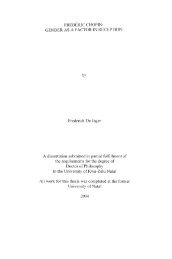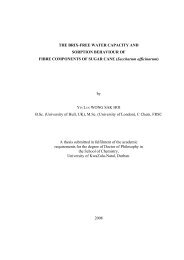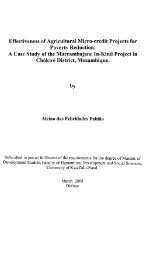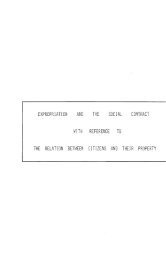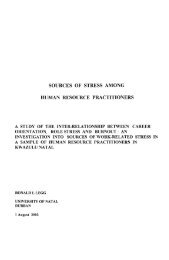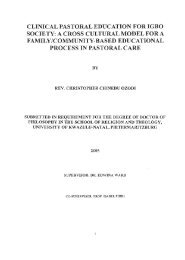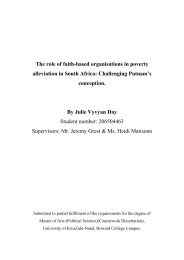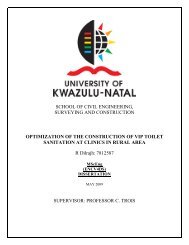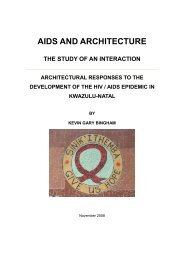View/Open - ResearchSpace - University of KwaZulu-Natal
View/Open - ResearchSpace - University of KwaZulu-Natal
View/Open - ResearchSpace - University of KwaZulu-Natal
You also want an ePaper? Increase the reach of your titles
YUMPU automatically turns print PDFs into web optimized ePapers that Google loves.
perform their duties due to that fact that they could not even afford to buy gloves, napkins for<br />
their patients as such, they ended up using their bare hands (Azwidihwi, Tshililo, Davhana-<br />
Maselesele, & Dphil, 2009). By using bare hands most caregivers are at risk <strong>of</strong> contracting<br />
infections and this can also result in death.<br />
2.7.3 Lack <strong>of</strong> support from family, patients and the community due to stigma<br />
G<strong>of</strong>fman (1959) describes stigma as labelling <strong>of</strong> a person as bad or unusual and shaming<br />
them due to their undesired differentness. According to Akintola (2008) stigma in the context<br />
<strong>of</strong> HIV/AIDS is still an issue that needs urgent attention especially in the HBC for PLWHA.<br />
Stigma results in blaming, shaming and loss <strong>of</strong> status in the stigmatized people (Deacon,<br />
2006). Stigma results in social exclusion and rejection (Holzemer, Uys, Makoae, Stewart,<br />
Phetilhu, Dlamini, Greeff, Kohi, Chirwa, Cuca and Naidoo, 2006) for example, some patients<br />
are locked up in their rooms by their families and they are denied food (Akintola,<br />
2004).Volunteer caregivers are not immune to stigma; they are also stigmatized by family,<br />
community members and friends. In South Africa for example, most volunteer caregivers<br />
face ridicule from family, community members and friends for risking their lives by<br />
providing care to PLWHA without receiving any pay, however they ignore such ridicules by<br />
“developing a thick skin” (Akintola, 2008:360-362).<br />
According to Akintola (2004), volunteer caregivers in his study came across family members<br />
who did not allow them to use gloves on their patients because they feared that the patients<br />
would feel unloved. To deal with this challenge, volunteer caregivers were forced to lie to the<br />
patients and their family members stating that they were using gloves in an attempt to protect<br />
the patient from infections. In other instances where families would not comply, volunteer<br />
caregivers used their bare hands or would not visit such homes. Most importantly, stigma<br />
interferes with voluntary counselling and testing; access to care and treatment (Holzemer &<br />
Uys, 2004). Stigma has a negative impact on infection control practices <strong>of</strong> the volunteer<br />
caregivers for PLWHA in HBCOs in that they have insufficient access to patients. This<br />
increases suffering, shortens life and may cause death to the PLWHA (Holzemer & Uys,<br />
2004) consequently it hinders the aims <strong>of</strong> HBC <strong>of</strong> reducing suffering providing hope and<br />
prolonging life.<br />
17



